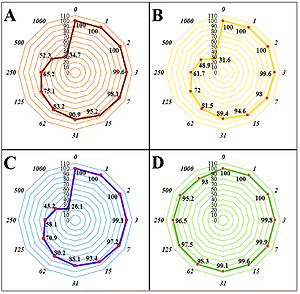Current issue
Archive
Manuscripts accepted
About the Journal
Editorial office
Editorial board
Section Editors
Abstracting and indexing
Subscription
Contact
Ethical standards and procedures
Most read articles
Instructions for authors
Article Processing Charge (APC)
Regulations of paying article processing charge (APC)
ONCOLOGY / BASIC RESEARCH
Antioxidant, cytotoxicity, and anti-human lung cancer properties of Linum usitatissimum seed aqueous extract in in vitro conditions: a pre-clinical trial study
1
Department of the First Respiratory, the First Hospital of Handan, Handan, Hebei, China
2
Department of Pathology, Baotou Tumor Hospital, Baotou, Neimenggu, China
3
Department of Anesthesiology, Handan Central Hospital, Handan, Hebei, China
4
Department of Comprehensive Oncology, Baotou Cancer Hospital, Baotou, Neimenggu, China
5
Department of Cardiothoracic Surgery, Zhengzhou Central Hospital affiliated to Zhengzhou University, Zhengzhou, Henan, China
6
Department of Respiratory and Critical Care Medicine, The First People’s Hospital
of Linhai, Linhai, China
7
Biology Department, College of Science, King Khalid University, Abha, Saudi Arabia
8
Zoology Department, College of Science, Damanhour University, Damanhour, Egypt, Saudi Arabia
9
Pathology Department, College of Medicine, Taif University, Taif, Saudi Arabia
Submission date: 2021-04-16
Final revision date: 2021-05-02
Acceptance date: 2021-05-03
Online publication date: 2021-05-12
Corresponding author
Yili Lou
Department of Respiratory and Critical Care Medicine, The First People's Hospital of Linhai, China
Department of Respiratory and Critical Care Medicine, The First People's Hospital of Linhai, China
KEYWORDS
TOPICS
ABSTRACT
Introduction:
Linum usitatissimum seed or flax seed is known as a potential candidate as a remedy to treat various diseases in many traditional medicines around the world. In the current study, the antioxidant, cytotoxicity, and anti-human lung cancer properties of Linum usitatissimum seed were investigated in in vitro conditions.
Material and methods:
Antioxidant activity of the plant was analyzed using radical scavenging activity and ferrous ion chelating assay. 3-(4,5-dimethylthiazol-2-yl)-2,5-diphenyl-2H-tetrazolium bromide (MTT) assay was used to evaluate anti-lung cancer properties of the plant.
Results:
The plant extract scavenged 2,2-diphenyl-1-picrylhydrazyl (DPPH) as a free radical with an IC50 of 34.2 ±0.9 µg/ml. The plant was also found to be rich in phenolic compounds with 294.8 ±2.3 mg GAE/g for total phenolic content. Cell viability of Linum usitatissimum seed was very low against lung poorly differentiated adenocarcinoma (PC-14), lung moderately differentiated adenocarcinoma (LC-2/ad), and lung well-differentiated bronchogenic adenocarcinoma (HLC-1) cell lines without any cytotoxicity towards the normal cell line. The best anti-human lung cancer properties of Linum usitatissimum seed against the above cell lines were observed in the case of the PC-14 cell line. According to the above findings, Linum usitatissimum seed may be administered for the treatment of several types of human lung cancer in humans. According to the results, the IC50 values of plant extract against lung poorly differentiated adenocarcinoma (PC-14), lung moderately differentiated adenocarcinoma (LC-2/ad), and lung well-differentiated bronchogenic adenocarcinoma (HLC-1) cell lines were found to be 392, 483, and 564 µg/ml, respectively.
Conclusions:
It appears the recent formulation can be used as a novel chemotherapeutic supplement in humans.
Linum usitatissimum seed or flax seed is known as a potential candidate as a remedy to treat various diseases in many traditional medicines around the world. In the current study, the antioxidant, cytotoxicity, and anti-human lung cancer properties of Linum usitatissimum seed were investigated in in vitro conditions.
Material and methods:
Antioxidant activity of the plant was analyzed using radical scavenging activity and ferrous ion chelating assay. 3-(4,5-dimethylthiazol-2-yl)-2,5-diphenyl-2H-tetrazolium bromide (MTT) assay was used to evaluate anti-lung cancer properties of the plant.
Results:
The plant extract scavenged 2,2-diphenyl-1-picrylhydrazyl (DPPH) as a free radical with an IC50 of 34.2 ±0.9 µg/ml. The plant was also found to be rich in phenolic compounds with 294.8 ±2.3 mg GAE/g for total phenolic content. Cell viability of Linum usitatissimum seed was very low against lung poorly differentiated adenocarcinoma (PC-14), lung moderately differentiated adenocarcinoma (LC-2/ad), and lung well-differentiated bronchogenic adenocarcinoma (HLC-1) cell lines without any cytotoxicity towards the normal cell line. The best anti-human lung cancer properties of Linum usitatissimum seed against the above cell lines were observed in the case of the PC-14 cell line. According to the above findings, Linum usitatissimum seed may be administered for the treatment of several types of human lung cancer in humans. According to the results, the IC50 values of plant extract against lung poorly differentiated adenocarcinoma (PC-14), lung moderately differentiated adenocarcinoma (LC-2/ad), and lung well-differentiated bronchogenic adenocarcinoma (HLC-1) cell lines were found to be 392, 483, and 564 µg/ml, respectively.
Conclusions:
It appears the recent formulation can be used as a novel chemotherapeutic supplement in humans.
Share
RELATED ARTICLE
We process personal data collected when visiting the website. The function of obtaining information about users and their behavior is carried out by voluntarily entered information in forms and saving cookies in end devices. Data, including cookies, are used to provide services, improve the user experience and to analyze the traffic in accordance with the Privacy policy. Data are also collected and processed by Google Analytics tool (more).
You can change cookies settings in your browser. Restricted use of cookies in the browser configuration may affect some functionalities of the website.
You can change cookies settings in your browser. Restricted use of cookies in the browser configuration may affect some functionalities of the website.



